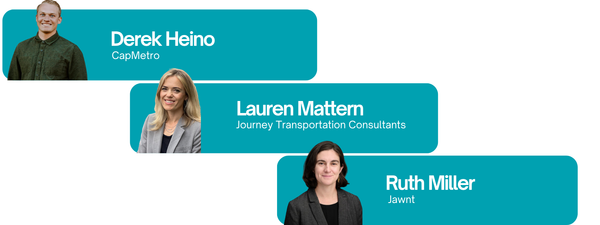All Aboard: Best Practices for Employee/Student/Residential Pass Programs
The best antidote to a crowded parking lot is transit. Organizations that manage their own parking facilities, such as larger employers, schools, and residential buildings, often offer free or subsidized transit passes to help people make the switch away from driving. These programs are so effective that transit agencies, including CapMetro, will then create pass programs tailored to organizations and their riding members. These programs can include simplified bulk ordering, discounts, marketing, and other support, and in some cities they are used by over half of the transit agency’s ridership.
CapMetro’s programs currently serves many private and public organizations, but CapMetro is in the process of modernizing its fare payment system. They launched the Umo app earlier this year and are expected to launch a contactless open loop system soon (bring your own card). Riders will have more ways to pay than ever, but what does that mean for these pass programs? What new options will become available to the organizations that already order and distribute passes through CapMetro, or the many more who have been waiting for new features?
Our first panelist, Lauren Mattern, will orient the audience to the context of employee, student, and resident transit pass programs within the context of TDM strategies. How important are transit programs for TDM strategies relative to other investments? What contexts are they most useful within? Lauren will highlight the future Austin pass programs needed to implement new TDM ordinance requirements.
Our second panelist Derek Heino of CapMetro oversees the CapMetro for Business program, transit pass agreements with local government organizations and universities, and non-fare revenue programs like transit advertising. They will help us understand the new experiences CapMetro is enabling for local organizations. Prior to joining the agency, Derek contributed to reshaping how individuals commute at Spin and car2go.
Our third panelist, Ruth Miller, will bring us into the details of what these programs are like for employer and university HR and sustainability teams, the transit agencies that administer them, and the riders who use them. What technology is available, how has it changed over the past few years, and where is it going? What should administrators and riders expect of a best-in-class system? Ruth is the Director of Product Partnerships at Jawnt, a third-party commuter benefits provider. She was previously the Head of Product at the MBTA, Boston’s transit agency, and launched Apple Maps in North America.

Panelists
Derek Heino is a Partnerships and Business Development Program Manager at CapMetro focused on expanding access to transit through employer and university partnerships. He oversees fare programs that support large institutions like UT Austin as well as a range of public and private employers. He previously worked on TDM strategies at Spin and car2go, helping organizations reduce single occupancy vehicle trips through shared mobility programs.
Lauren Mattern is a national TDM planner and founder of mobility and transit firm Journey. She frequently crafts TDM strategies for stadiums, large developments, and station areas to reduce single occupancy vehicle trips through managed parking and TDM programs like transit pass programs. She has practiced TDM planning nationwide and in the UK at Transport for London. She has worked extensively in the TDM landscape here in Austin Texas, on policy making and implementation of the developer TDM code.
Ruth Miller is the Director of Product Partnerships at Jawnt, a third-party commuter benefits provider. She was previously the Head of Product at the MBTA, Boston’s transit agency, and launched Apple Maps in North America. Ruth has helped millions of people ride transit through the tools she developed at Apple, Lyft, the MBTA, and MIT.
